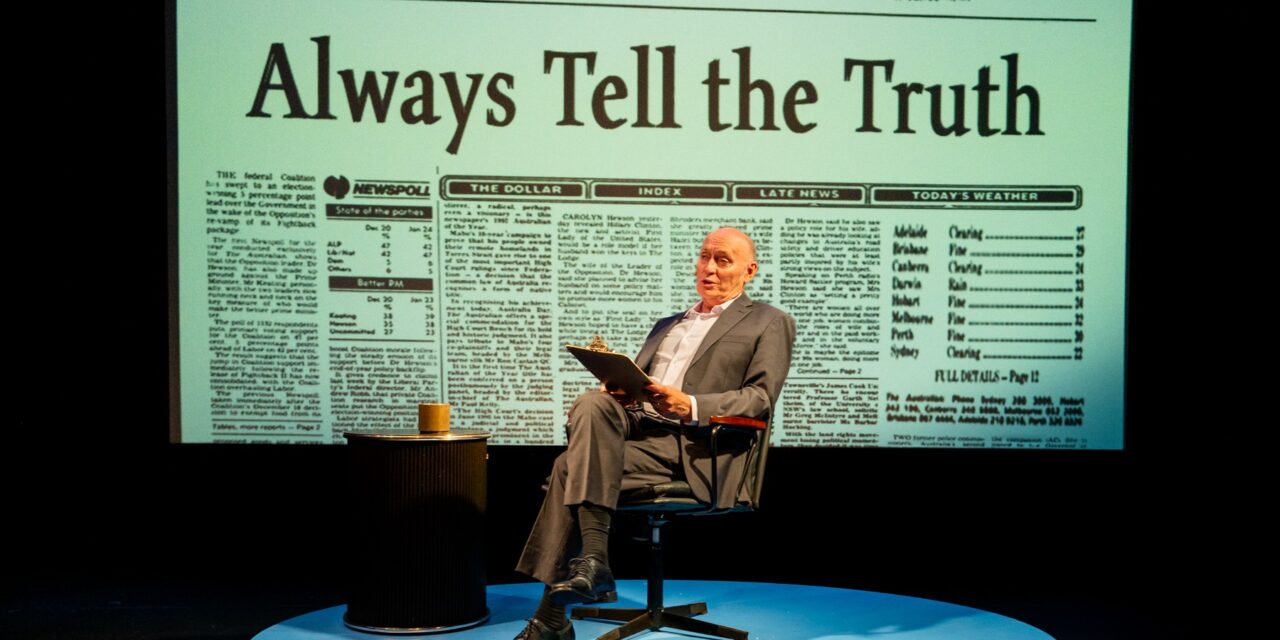A Roller Coaster Ride through the Life of Rupert Murdoch
By Alix Cohen
In 1996, Primary Colors was published with authorship credited to Anonymous-later revealed to be journalist Joe Klein. Ostensibly to avoid law suits, Murdoch- The Final Interview was submitted in “a plain manila envelope at the door …Inside was a script and a note: the playwright wished to remain anonymous…” (Producer Eric Krebs.) In this era of constant political retribution, the trope fits.
Keith Rupert Murdoch (Jamie Jackson) hobbles onto the stage, straightens up and becomes smarmy television journalist, Chodrum Trepur, an acknowledged News Corp. employee. Ninety-four year-old Murdoch has no recollection of agreeing to an interview.
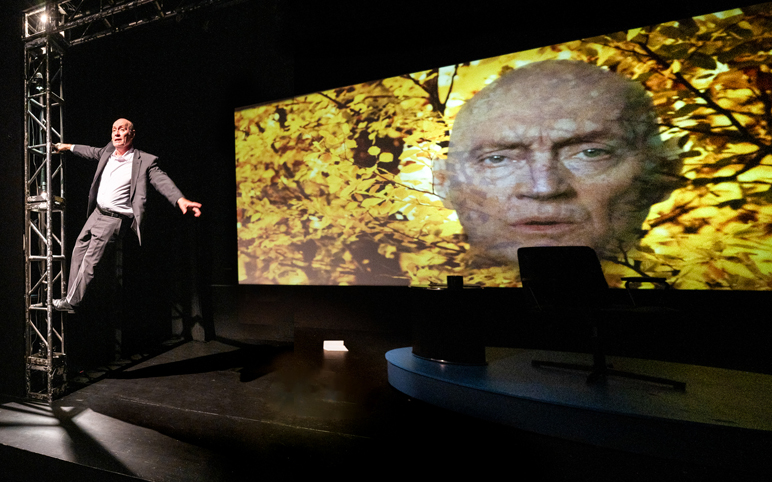
The play/interview is divided into fragmented sections utilized by Murdoch outlets: Page One, the headline. Section Two- local news, his beginnings. Three is international news, how he went global. Four is business. Five: politics and opinion- Six is… marriage and relationship tips. And finally, the back page; letters to the editor. Photos, art and videos are projected. Jackson plays all roles.
Murdoch (1931) was raised with what his mother called “loving discipline.” The subject exemplifies this as being thrown into a pool when he couldn’t swim and forced to sleep outside the house. His father was intimidating and judgmental with, as portrayed, a stentorian stutter.
We see the boy climb a tree to show dad the height he can achieve. (Jackson climbs metal gridwork stage right.) “The only way you could get your father’s attention was by provoking him,” Trepur observes. Murdoch bristles. “My father was just an editor, not an owner. I saw you needed to own your own writers and cartoonists,” he says sharply. (Note the acknowledgment of cartoonists re recent events.)
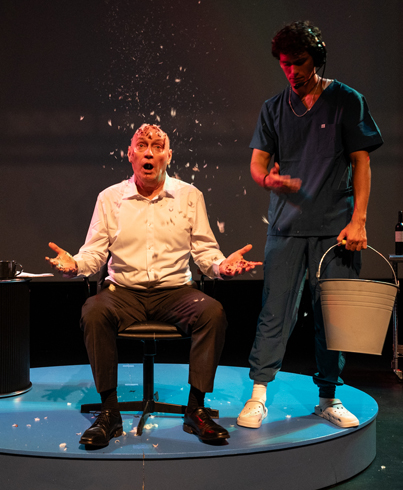
A left-winger at Oxford, Murdoch gradually swung right after his father died. The calculated evolution was shaped by business strategy, media opportunity, and personal ideology. “You started an idealist and ended up a megalomaniac,” the interviewer notes. A push/pull situation finds the subject often outraged and defiant.
Beginning with a small Australian newspaper in the 1950s, Murdoch expanded through strategic acquisitions to create News Corporation, transformed television with Skye and Fox Networks (becoming an American citizen to accomplish the latter) and extended into book publishing with Harper Collins. “Monopoly is a terrible thing until you have it,” he comments.
Scandals including phone hacking in Britain, ties to election frauds, questionable relationships with political figures, and sexual harassment at Fox News- we meet fortress-of-self-regard, Roger Ailes- are addressed.
Shaping public opinion and amplifying right wing narrative, Fox News in particular has played a pivotal role in the rise of Donald Trump. Like the president, Murdoch prioritizes influence over objectivity making power the endgame.
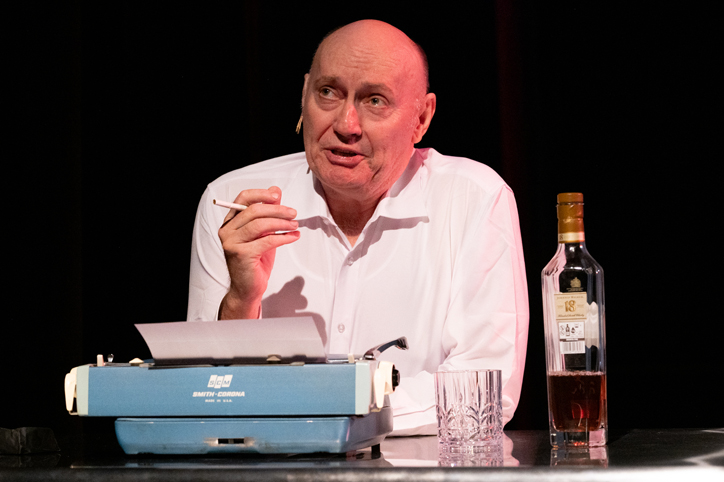
We see the subject arriving at Fleet Street. “I know you, my congregation, your rage is as deep as mine,” he says addressing readers. “It’s the lowest common denominator which unites the largest number of people.” The delusional mogul protests he’s not among the elite.
Tabloid headlines and images (many sexual) fill the screen. His motto, Murdoch reminds us, is Always Tell the Truth, but as Paul Simon wrote, “one man’s ceiling is another man’s floor.” “The public has a right to know” becomes a panacea.
An unidentified stagehand traverses the stage spewing money from a small machine. A bucket labeled SHIT is (yech) employed. Murdoch speaks with JFK (as played by Jackson- not a good idea), refers to association with Ed Koch, Bill Clinton, Ronald Reagan, and Donald Trump. Wives (5) emerge only as mention; progeny merely in terms of controlling his empire.
The subject appears onscreen as a giant floating head (The Wizard of Oz) and Dr. Frankenstein among others. Aspiring tycoons and fascists take notes. There’s information, insight, and warning, though you’ll need a scythe to cut through exposition and metaphor.
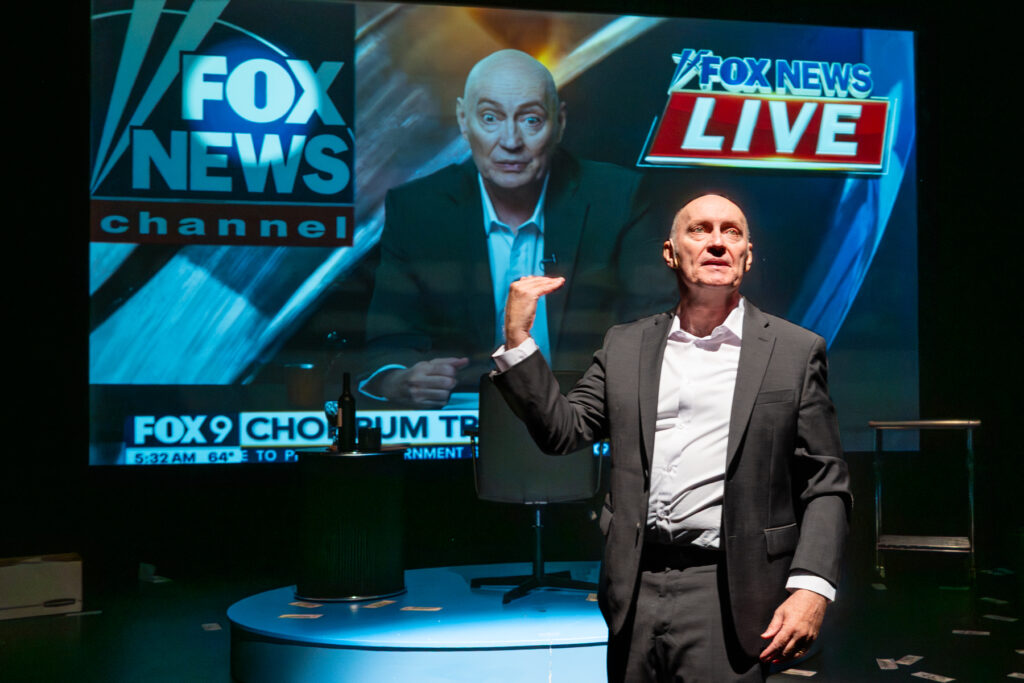
Jamie Jackson is fantastic in a cornucopia of roles. He turns on a dime inhabiting changed physicality and precise accents. That the actor make us believe Murdoch’s feelings during what may be a psychic break, fantasy, acid trip, confrontation with the devil, or… is a credit to intelligence, skill, focus and direction. Even when confused by narrative, we believe him. A tour de force.
Director Christopher Scott has adroitly defined characters and manifested milestones in Murdoch’s life. Staging is imaginative and effective. Vaudevillian gimmicks are rampant. While some embellish, others are distractingly over the top. Editing would be welcome in a headlong script which paints so wide a swath, one grows dizzy. William Butler Yeats’ The Second Coming is quoted, scrolled and set to music weighing down without illuminating.
“Journalists may write the first draft of history, but dramatists write the last.” Sophocles 497-406 BC
Minimal Set by Peter R. Feuchtwanger serves well.
Projections/Video Design (Andy Evan Cohen) is evocative, illuminating, and occasionally wry.
Sound Design (Josh Weidenbaum) unnerves and adds color.
Photos by Russ Rowland
Murdoch- The Final Interview by Anonymous
A new American play by an unnamed source
Through December 28, 2025
Featuring Jamie Jackson
Directed by Christopher Scott
Theater 555- 666 West 42nd Street
https://murdochthefinalinterview.com/

